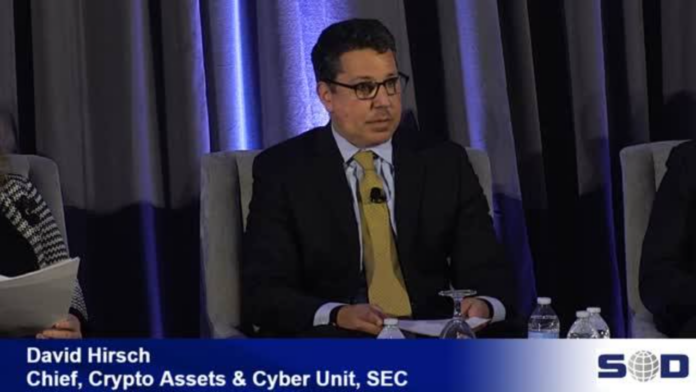The United States Securities and Exchange Commission (SEC) has witnessed a significant shift in its leaders, as David Hirsch, crypto enforcement chief of the agency’s Crypto Asset and Cyber Unit, has announced his departure after nearly nine years of service. This move comes amidst a wave of crypto regulation scrutiny and crypto enforcement actions targeting the rapidly evolving cryptocurrency landscape.
Hirsch’s departure from the SEC marks the end of an era, during which he played a pivotal role in shaping the agency’s approach to digital assets and cybersecurity. As the leader of the Crypto Asset and Cyber Unit, Hirsch oversaw a series of high-profile enforcement actions, including the SEC’s civil lawsuits against crypto exchanges Coinbase, Binance, and Kraken, as well as the agency’s crackdown on the collapsed Terraform Labs and FTX.
Hirsch’s Tenure at the SEC
David Hirsch’s journey with the SEC began in 2015 when he joined the agency as an enforcement attorney in the Fort Worth Regional Office. Over the years, he rose through the ranks, taking on increasingly complex investigations and challenging issues. In 2020, Hirsch was appointed as counsel to Commissioner Caroline Crenshaw, further solidifying his influence within the SEC.
In October 2022, Hirsch assumed the role of head of the Crypto Asset and Cyber Unit, a critical division responsible for protecting investors from crypto assets-related threats and ensuring compliance with federal crypto securities laws. During his tenure, the unit underwent a significant expansion, nearly doubling in size to better equip the agency in policing wrongdoing in the crypto markets.
Hirsch’s Achievements and Legacy
Reflecting on his time at the agency, Hirsch expressed immense pride in the “historic work” accomplished by the Unit team under his leadership. He credited the success of the unit to the collaborative efforts of his colleagues, mentors, and partners across various regulatory agencies working towards a common goal.
Hirsch’s tenure was marked by a series of high-profile enforcement actions that aimed to protect investors and maintain the integrity of the financial markets. The SEC’s civil lawsuits against crypto exchanges Coinbase, Binance, and Kraken, as well as the agency’s crackdown on the collapsed Terraform Labs and FTX, were all spearheaded under Hirsch’s guidance.
The Evolving Landscape of Crypto Regulation
Hirsch’s departure from the SEC comes at a critical juncture, as the agency continues to grapple with the rapidly evolving landscape of cryptocurrency oversight. The agency’s aggressive enforcement actions under Hirsch’s leadership have been a source of both praise and criticism, with some industry players accusing the agency of stifling innovation in decentralized finance and driving crypto businesses out of the United States.
Former President Donald Trump, for instance, has been vocal in his criticism of the agency’s “hostility towards crypto,” arguing that the agency’s crackdown is causing the industry to move out of the country. This political pressure has been a significant factor in the decision-making, particularly in the approval of spot Ethereum ETFs in May, which was widely seen as a response to the growing attention crypto has gained on the campaign trail.
The Impact of Hirsch’s Departure
Hirsch’s departure raises questions about the agency’s future direction in regulating the cryptocurrency industry. As the head of the SEC Crypto Asset and Cyber Unit, Hirsch played a crucial role in shaping the approach to digital assets, and his exit could signal a potential shift in the agency’s priorities and strategies for crypto oversight.
The timing of Hirsch’s departure is also noteworthy, as it coincides with a series of other notable changes within the SEC, including the resignation of two attorneys involved in the controversial Digital Licensing Inc. (DEBT Box) case and the announcement of the closure of the Salt Lake Regional Office. Hirsch also shared in a LinkedIn post that his son heads to college this fall, so he plans to travel with family before deciding on his next career move.
The Evolving Role of the SEC Crypto Asset and Cyber Unit
The Crypto Asset and Cyber Unit has been at the forefront of the agency’s efforts to regulate the digital asset industry. Under Hirsch’s leadership, the unit has grown in size and scope, reflecting the increasing importance of cryptocurrency and cybersecurity within the broader mandate.
As Hirsch departs, the future of the Crypto Asset and Cyber Unit remains uncertain. The agency will need to carefully consider the unit’s priorities and the expertise required to effectively navigate the complex and rapidly changing crypto landscape. This includes addressing issues like crypto asset classification, litigation, oversight of trading platforms and crypto exchanges, pursuing crypto fraud cases, combating crypto market manipulation, ensuring crypto asset investor protection through appropriate crypto asset disclosures, registration, and reporting requirements.
The unit will also need to tackle crypto asset custody rules, accounting standards, tax rules, anti-money laundering measures, sanctions compliance, lending regulations, and crypto asset staking rules. The selection of Hirsch’s successor will be a crucial decision that will shape the agency’s approach to digital asset regulation in the years to come.
Implications for the Crypto Industry
Hirsch’s departure has likely to have significant implications for the cryptocurrency industry. As the head of the Crypto Asset and Cyber Unit, Hirsch was a central figure in the SEC’s enforcement actions, which have been seen by some as overly aggressive and potentially stifling innovation, especially for emerging DeFi projects.
The industry will be closely watching the next moves, particularly in terms of its approach to regulating digital assets. The agency’s future enforcement actions, policy decisions, and the appointment of Hirsch’s successor will be closely scrutinized by crypto businesses, investors, and enthusiasts alike.
The Evolving Regulatory Landscape
The departure of the crypto enforcement chief comes at a time when the regulatory landscape for digital assets is in flux. Globally, policymakers and regulators are grappling with the challenges posed by the rapid growth and innovation in the cryptocurrency industry, seeking to strike a balance between fostering innovation and protecting investors.
In the United States, the SEC’s approach to crypto asset rules has been a source of ongoing debate and controversy. While the agency has taken a more assertive stance under Hirsch’s leadership, the industry has argued that the agency’s actions have been overly heavy-handed, stifling the development of the crypto ecosystem.
The Role of Political Pressure
The crypto industry’s concerns about the approach have not gone unnoticed in the political sphere. Former President Donald Trump’s criticism of the agency’s “hostility towards crypto” and his assertion that the industry is “moving out of the U.S. because of hostility” have added a new layer of complexity to the regulatory landscape.
This political pressure has been a significant factor in the SEC’s decision-making, as evidenced by the agency’s approval of spot Ethereum ETFs in May, which was widely seen as a response to the growing attention crypto has gained on the campaign trail.
Navigating the Evolving Crypto Regulatory Landscape
As the SEC navigates the evolving crypto regulatory landscape, the agency will need to carefully balance the need to protect investors with the imperative to foster innovation and maintain the United States’ competitiveness in the global digital asset market.
The selection of Hirsch’s successor as the head of the Crypto Asset and Cyber Unit will be a critical decision that will shape the SEC’s approach to digital asset regulation in the years to come. The agency will need to ensure that it has the necessary expertise and resources within its enforcement division to effectively oversee the rapidly changing crypto industry, while also addressing the concerns of both industry players and policymakers.
The Importance of Collaboration and Transparency
Throughout his tenure, Hirsch emphasized the importance of collaboration and teamwork in the agency’s enforcement efforts. He acknowledged that “securities enforcement is a team sport” and credited the success of the Unit to the combined efforts of his colleagues, mentors, and partners across various regulatory agencies.
As the it navigates the evolving crypto regulatory landscape, this spirit of collaboration and transparency will be crucial. The agency will need to work closely with industry stakeholders, policymakers, and international regulators to develop a coherent and effective regulatory framework that fosters innovation while protecting investors.
Conclusion
The departure of David Hirsch, marks a significant shift in the agency’s approach to digital asset regulation. Hirsch’s tenure was marked by a series of high-profile enforcement actions that aimed to protect investors and maintain the integrity of the financial markets.
As the SEC moves forward without Hirsch’s leadership, the agency will need to carefully consider the future direction of the unit and the broader regulatory landscape for digital assets. The selection of Hirsch’s successor and the agency’s approach to crypto regulation will have far-reaching implications for the cryptocurrency industry, investors, and the United States’ competitiveness in the global digital asset market.
Disclaimer: The information provided in this article is for informational purposes only and does not constitute financial advice. Investing in cryptocurrencies involves risks, and readers should conduct their own research and consult with financial advisors before making investment decisions. Hash Herald is not responsible for any profits or losses in the process.













